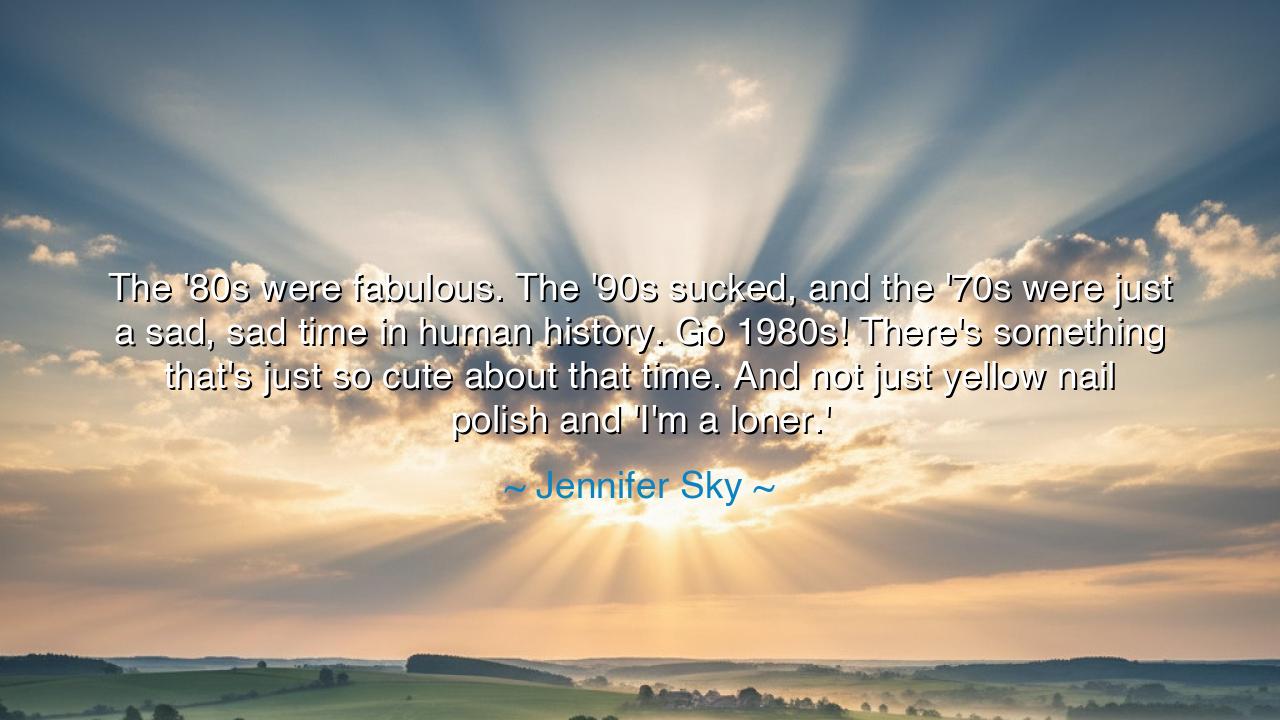
The '80s were fabulous. The '90s sucked, and the '70s were just a
The '80s were fabulous. The '90s sucked, and the '70s were just a sad, sad time in human history. Go 1980s! There's something that's just so cute about that time. And not just yellow nail polish and 'I'm a loner.'






Hear now the lively yet poignant words of Jennifer Sky, who declared: “The ’80s were fabulous. The ’90s sucked, and the ’70s were just a sad, sad time in human history. Go 1980s! There’s something that’s just so cute about that time. And not just yellow nail polish and ‘I’m a loner.’” Though spoken with humor, these words are a window into the soul’s yearning for eras past, and a reminder that each generation weaves its own tapestry of sorrow, struggle, and joy. They speak not only of fashion or music, but of the spirit of an age—the way entire decades carry moods that shape lives.
The ’70s, as Sky calls them, were indeed a season of turmoil. Across the globe, wars dragged on, leaders fell, economies faltered, and trust in institutions withered. The youth felt the disillusionment of dreams betrayed. It was, as she says, a “sad, sad time,” marked by shadows rather than light. When a generation grows beneath clouds of uncertainty, the memory clings like dust upon their spirit, so that even years later, the decade is recalled with heaviness rather than celebration.
The ’80s, however, were different. They were remembered as “fabulous,” bursting with color, invention, and excess. Technology surged forward; music and art flourished in vibrant expression; the world, though imperfect, seemed to rediscover its confidence. To call them “cute,” as Sky does, is to celebrate the charm of their boldness, their fearless experiments with style and culture. It was a time when youth believed again that joy could be loud, that identity could be playful, and that tomorrow might bring possibility rather than despair.
The ’90s, in her words, “sucked.” They were a decade caught between eras, burdened with cynicism, as the optimism of the ’80s waned and the shadows of a new century crept in. Disillusionment spread once more, and culture seemed fractured, uncertain of its voice. To those who lived through it, the contrast was sharp: after the excess of the ’80s, the ’90s felt muted, restless, and strangely hollow. Thus Sky captures the way in which decades carry emotional weight, shaping not only society but the very identity of those who lived within them.
History often bears out such rhythms of light and shadow. Consider the fall of Rome: the golden decades of peace and prosperity remembered as blessed, the centuries of decline recalled as sorrowful. Or think of the Renaissance, bursting with brilliance after the gloom of the Middle Ages. So it is with modern decades as well—time itself seems to breathe, to inhale with vibrancy and exhale with weariness, carrying generations with it. Jennifer Sky’s playful declaration echoes this eternal cycle.
The lesson is clear: every age has its own spirit. To live is to be shaped by the decade of one’s youth, yet wisdom lies in learning not to be imprisoned by its moods. Celebrate the joyous times, as Sky does with the ’80s, but do not despair over the sorrowful ones, for they too contain lessons. Even the “sad, sad” seasons teach endurance, humility, and resilience. The soul that can draw meaning from both joy and sorrow will not be broken by the shifts of time.
Practical is this counsel: when you look upon your own past, do not merely say “this age was good, and that age was bad.” Ask instead, “What did I gain from each?” The joyful years gave you laughter and memory; the darker years gave you strength and perspective. Share these reflections with others, so that younger generations may know that no decade defines the soul entirely. For the spirit of man can shine even in the gloomiest of ages.
Thus remember Jennifer Sky’s words not merely as nostalgia but as teaching. The ’80s were fabulous, yes—but the truth is deeper: every time has its beauty, every season its sorrow. The wise learn to cherish the light, endure the dark, and see both as chapters in the larger story of humanity. For though decades change their garments, the human heart remains eternal, longing always for joy, and capable always of triumph.






AAdministratorAdministrator
Welcome, honored guests. Please leave a comment, we will respond soon